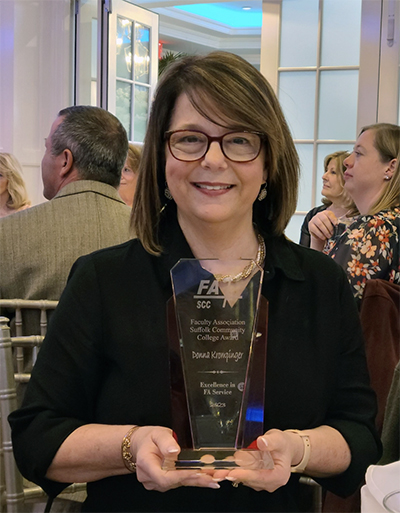Cynthia Eaton
Donna Krompinger isn’t the person you picture when you think “union activist.” She’s not someone who will grab a megaphone and rally the membership to action. Quite the opposite, since starting at the college in 2005 as a college aide, Donna has long preferred to be behind the scenes. The nature of her work, however, in the Office of Faculty & Professional Advancement has led Donna to seek out more visible positions. Q — Professional assistants (PA) are our largest constituency group, after classroom faculty. The role of PA’s is sometimes misunderstood, partly because PA’s hold such a wide range of roles at the college. Talk to us about what is your role as a PA. A — I have always worked in the Office of Faculty & Professional Advancement (OFPA) and in Adjunct Services. I started as a college aide in 2005 after my youngest was in kindergarten. I became an adjunct PA in 2011, then was fortunate to be hired in my current role as a full-time PA in 2014. Prior to working at the college, I was a branch manager at a financial institution but left to raise my children. Q — You were nominated for this award based on several ways you contribute to the FA, including your service as a mentor for our new member program. How has that been going? A — I was first asked to serve as a mentor by New Member Program Coordinator Matt Pappas. To date, I have mentored six colleagues. And I continue to reach out to them, even though they aren’t still officially assigned to me. It’s not just “year one and done” for me. I make sure things are still going okay, I let them know I’m still here if they have questions. To me, being a good mentor means continuing to build those relationships, ideally moving from mentorship to friendship with my colleagues. As nonteaching faculty, I worried that it wasn’t my business to interject into academic conversations, but all of us in the FA have a role to play in helping students in every way we can. Whenever I see a student in the hallway or in our office, I treat them like I would want my own children to be treated. If a student asks me a question, I make phone calls and make sure they know exactly where to go next and why. That’s my contribution to retention, making students feel wanted and welcomed. That’s something we all should do. Q — As if your FA committee service and mentoring wasn’t enough, you also stepped up to serve as the acting chairperson of our FA elections committee this year. That’s a big job! Why do you do all that you do? A — Coming in to this role, I had no previous experience with a large election ballot count for all the officers, delegates and half of the Executive Council (EC). Looking back, I realize that I know so much more now. I would jump in again, knowing now what I have to do. I think I did a good job communicating with the committee and I made sure to treat all candidates in a friendly, equitable fashion. I also attended all of the EC meetings and kept that group informed. I think the reason I do all these things was always to be a good example for my children: to contribute, to be a good person and to be kind. Nobody is perfect. Even good people make mistakes, but what matters is the gesture of doing good things for others. I really like contributing. I like being able to say, “I helped with that” or “I did something that benefitted others.” Q — What does it mean to you to be involved with the FA? Why should everyone contribute to the union? A — The FA is so important, especially for adjunct faculty. Michele Fitzpatrick does the intake of new adjunct faculty and she’s good about sharing information about the FA as well as the membership form. But whenever I’m introduced to them, I also explain the benefits of joining. I tell people that I was an adjunct for years, so I know what it’s like, and I tell them that I’m an active member now. Sometimes they might hesitate because they are unclear about dues, so I explain how they are prorated by contact hours rather than a set amount. |
